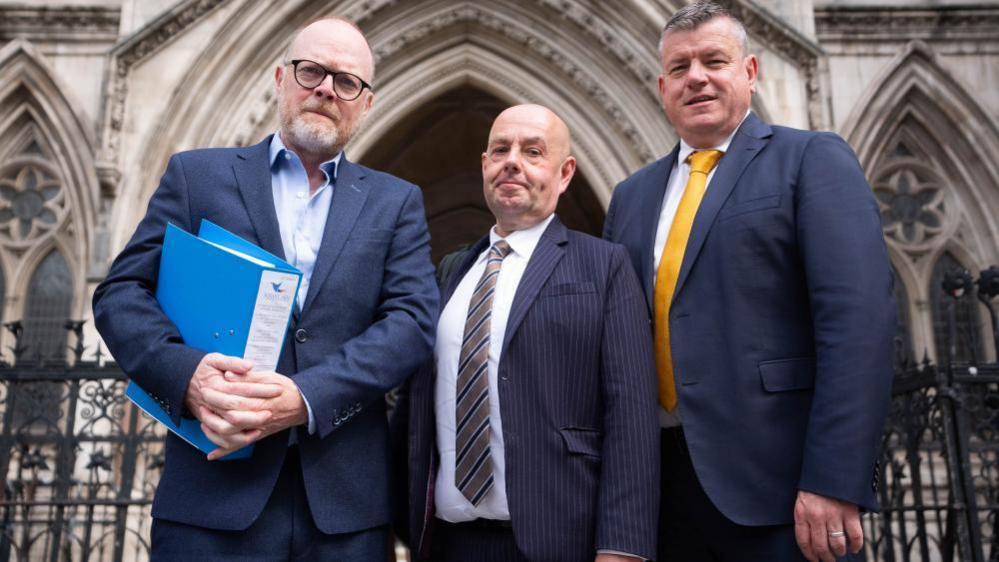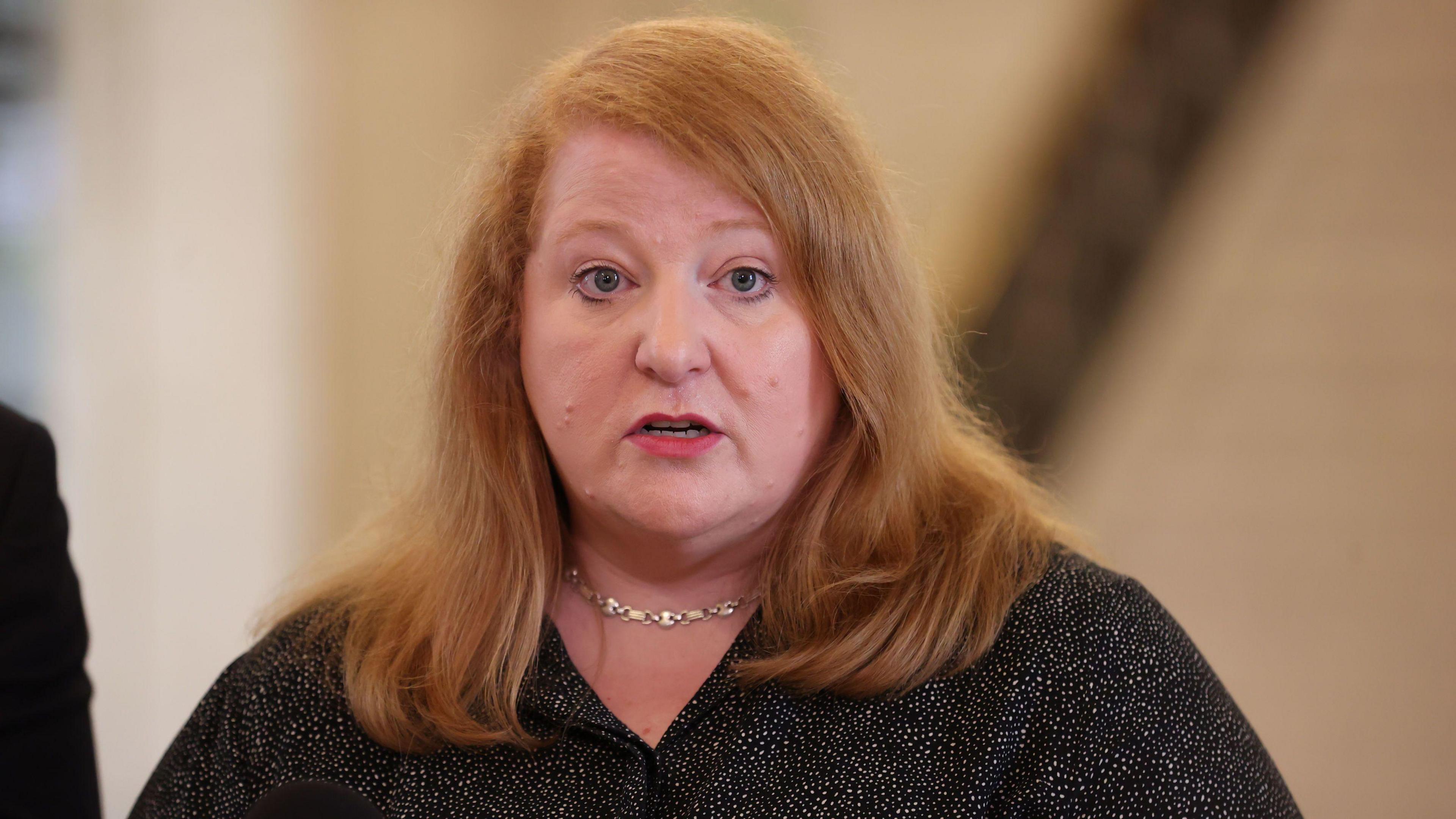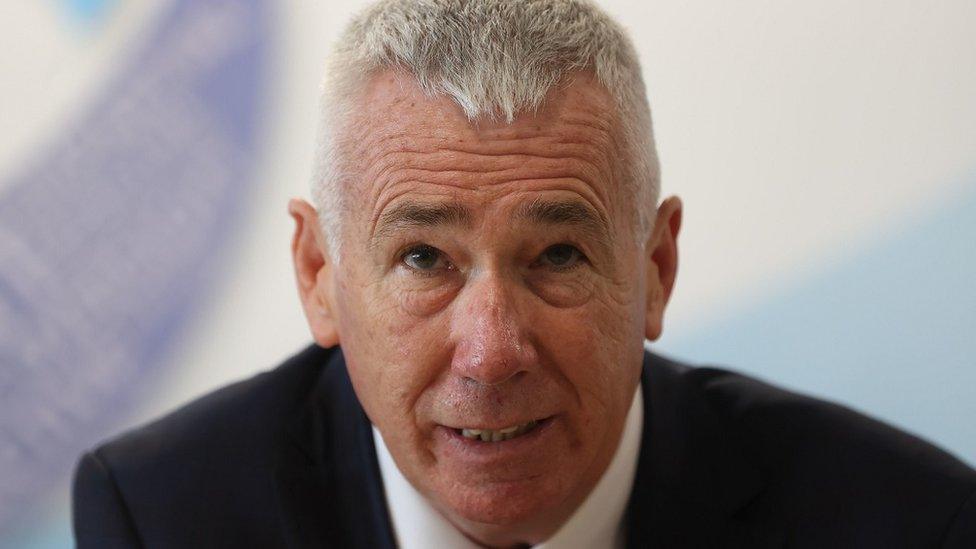NUJ to intervene in police surveillance case

Journalists Trevor Birney, Barry McCaffrey and their lawyer Niall Murphy were outside the courts
- Published
A court in London examining allegations of police surveillance of journalists in Northern Ireland has allowed the National Union of Journalists (NUJ) to intervene in the case.
The Investigatory Powers Tribunal is examining allegations that the Police Service of Northern Ireland (PSNI) used unlawful covert surveillance against two journalists.
The case involving Barry McCaffrey and Trevor Birney has since widened to hear claims that multiple journalists were routinely monitored in an attempt to identify their sources.
In the latest hearing on Thursday, the tribunal accepted an application from the NUJ to join the case in the form of written submissions.
'Extraordinary rant'
Brenda Campbell KC, representing the NUJ, said the case "impacts on the safety of journalistic sources" in areas including media reporting of paramilitary activity.
She said the case has raised "well-founded concern" about the "nature and extent" of surveillance of reporters.
Ms Campbell said the NUJ's role would be "that of an independent organisation" which could offer its expertise on protecting journalistic sources.
Lord Justice Singh, sitting on the tribunal panel alongside Lady Carmichael and senior barrister Stephen Shaw KC, said the "appropriate and proportionate course" was to allow NUJ involvement "but only in writing".
The tribunal at the Royal Courts of Justice also heard an application to compel a former police detective for Durham Constabulary to give evidence in the case, which is due to enter full hearings in October.
The officer had been involved in a controversial police investigation in 2018 into information obtained by Mr McCaffrey and Mr Birney for a documentary film.
Their arrest over the material, which a court later found was “inappropriate”, prompted the complaint to the Investigatory Powers Tribunal (IPT).
Mr McCaffrey's lawyer said the former officer had submitted an “extraordinary rant” to the tribunal and it was clear he would “not attend voluntarily”.
“We do say this is an appropriate case for cross-examination,” he added.
Jonathan Glasson KC, counsel for the tribunal, said the former police officer is “not legally represented” but had “made clear he is not willing to assist”.
After deliberations, the judge said the tribunal panel had concluded the former officer should be cross-examined in light of the “circumstances of this unusual case”.
But he said they believed such a summons should be issued via an application to the high court.
Mr Glasson outlined how the former officer would be notified of the ruling “as soon as possible”.
The tribunal refused an application for claims brought by the BBC to be formally joined with the case involving Mr McCaffrey and Mr Birney.
Jude Bunting KC, representing the BBC, said the complaint alongside its former journalist Vincent Kearney was "ready for determination”.
He said joining the cases would save time and resources, adding: "One case adds light to the other and vice versa.”
Lord Justice Singh said the "priority" was for the case involving Mr McCaffrey and Mr Birney to proceed to substantive hearings as planned in October.
He said that "on balance" the panel had decided to refuse the application, adding: "It will give everyone clarity on what to focus on."
How did the PSNI surveillance of journalists emerge?
In 2018, Mr McCaffrey and Mr Birney were controversially arrested by police investigating the alleged leaking of a confidential document used in a film they made on a Troubles massacre.
The PSNI asked Durham police to lead the investigation into the inclusion of the Police Ombudsman document in the film on the 1994 loyalist murders in Loughinisland, County Down.
The journalists later won a court case which found that warrants used to search their homes had been “inappropriate”.
The judge said they had acted properly in protecting their sources in a lawful way and the PSNI later paid damages amounting to £875,000.
A case was then filed by the journalists with the IPT.
It has heard they were arrested in the hope of flushing out a source.
The tribunal was also told Mr McCaffrey was the subject of surveillance on multiple occasions, including in 2013 when his phone was accessed while he pursued allegations of police corruption.
Lawyers acting for the BBC have also written to the IPT about the alleged police surveillance of one of its former journalists.
Vincent Kearney worked on BBC Spotlight and presented a programme about the Police Ombudsman's office in 2011.
Separately in June, a report to the Northern Ireland Policing Board said the PSNI had made more than 320 applications to access the communications data of journalists over the past 13 years.
This included 10 occasions related to attempting to identify their sources by covert means.
The PSNI has also announced an independent review of any use of surveillance against journalists and other specific groups by police.
- Published4 June 2024

- Published10 May 2024
